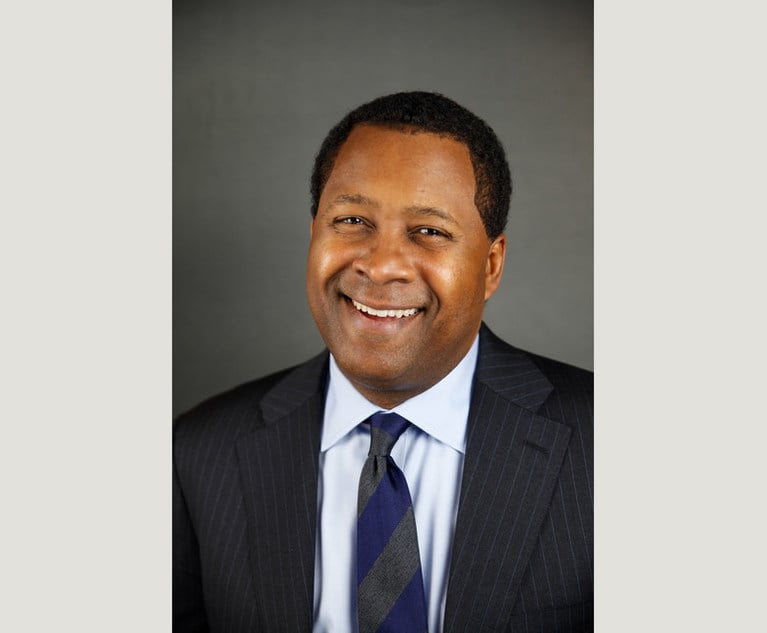Compliance Hot Spots: For White-Collar Lawyers, a New Normal | Addressing Anti-Corruption Risks From the Coronavirus | Sen. Richard Burr Is Sued Over Stock Sales | Who Got the Work
Ex: White-collar defenders are facing new challenges and uncertainty in the virus era. Plus: confronting anti-bribery efforts amid the pandemic. Scroll down for Who Got the Work, headlines and much more. Thanks for reading, and stay safe.
March 24, 2020 at 09:00 PM
11 minute read
Welcome to Compliance Hot Spots, our snapshot on white-collar, regulatory and compliance news and trends. We hope you, colleagues, family and friends are staying safe and healthy amid the coronavirus pandemic. I spoke with leading white-collar partners about how the crisis is affecting day-to-day work. Plus: addressing anti-corruption risks from the coronavirus. Scroll down for Who Got the Work, headlines and more.
Tips, feedback and thoughts on your practices are always appreciated. How are you coping with the covid-19 crisis? Reach C. Ryan Barber in Washington at [email protected] and at 202-828-0315. Follow @cryanbarber. Contact Mike Scarcella at [email protected] and follow him on Twitter @Mikescarcella. Thanks for reading, and stay safe.

New Normal Sets In for White-Collar Lawyers in the Virus Era
Since the end of last week, major U.S. law firms have largely shuttered, their lawyers and most support staff swept up in the tide of teleworking. A new normal has set in with an unknown end date, presenting indefinite delays and other challenges to lawyers grappling in their own ways with an unprecedented public health emergency.
For white-collar defense lawyers, the international travel required for investigations into foreign bribery and other corporate misconduct has been rendered virtually impossible. And in a practice that prizes in-person meetings—better to gauge a witness' credibility in an interview or take a prosecutor's temperature—virtual communication has become commonplace.
With the grace of a solid WiFi connection, colleagues who were once down the hall are now reachable only via videoconferencing. The teleconferencing service Zoom has emerged as an essential link for work life.
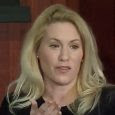 "Actually interviewing people as part of an internal investigation, appearing before the government in whatever capacity—that is just not something that lends itself to remote work," said Sandra Moser (at left), a partner at Quinn Emanuel Urquhart & Sullivan who previously headed the fraud section in the Justice Department's criminal division.
"Actually interviewing people as part of an internal investigation, appearing before the government in whatever capacity—that is just not something that lends itself to remote work," said Sandra Moser (at left), a partner at Quinn Emanuel Urquhart & Sullivan who previously headed the fraud section in the Justice Department's criminal division.
"Frankly, that's why people who are in public service report to work every day," she said.
In interviews, lawyers described the Justice Department and other government agencies as considerate of the new challenges companies are confronting in the coronavirus crisis. Those agencies have found themselves in the same position as their defense bar counterparts, broadly encouraging or even requiring employees to work from home.
One lawyer said a client's FBI interview was canceled, while others pointed to delayed court proceedings and in-person meetings turned into teleconferences.
"So far, it's been my experience that the government's been very understanding and accommodating in view of the current circumstances. They're under the same constraints and face the same challenges as those working outside of government," said Matthew Miner, a partner at Morgan, Lewis & Bockius who served until last year as a deputy assistant U.S. attorney general in the Justice Department's criminal division.
Miner questioned whether the Justice Department might be more lenient, in light of the challenges raised by coronavirus, when weighing whether companies promptly addressed misconduct and reported it to the government.
"It would be helpful to have a little more openness from the government on what it might be more forgiving of during this period of time," he said.
>> More reading: Supply Chains Crack Under Pandemic as Corporate Counsel Tangle Over Novel Force Majeure Issues. "We are swamped," Cristina Shea told Corporate Counsel. "Everything is on fire right now." Shea, a partner in Reed Smith's San Francisco office, focuses on representing corporations in disputes with their insurance companies. [Corporate Counsel]

Addressing Anti-Corruption Risks From the Coronavirus
Hewlett Packard Enterprise executive Rebecca Rohr, vice-president of anti-corruption and global trade within the ethics and compliance office, this week looked at how compliance officers should think about the coronavirus crisis and anti-corruption risks.
"Though the immediate concerns of the coronavirus relate to employee health and safety, the outbreak—and its business disruption—may increase the risk of bribery and corruption," Rohr writes. Rohr looks at what compliance officers can do to mitigate against the potential of increased risk in the COVID-19 era:
>> "Engage with other groups in the company to make sure that employees' health and safety concerns are being addressed. Messages and training from the compliance function will have much more weight if the compliance function has credibility from prioritizing employees' welfare first."
>> "Reinforce existing anti-corruption policies through targeted communications. Compliance officers might want to refer explicitly to the disruption caused by the coronavirus and emphasize that the company is committed to complying with anti-corruption laws. The communications should be directed at the employees who need to see them."
Rohr's full piece is over at ALM affiliate Corporate Counsel.
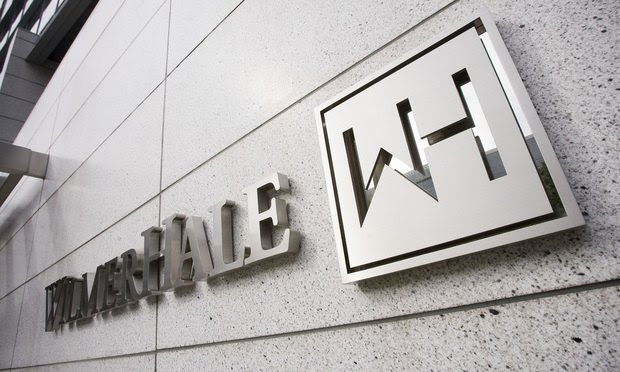
Who Got the Work
>> Wilmer Cutler Pickering Hale and Dorr partner Kelly Dunbar is counsel to the The Securities Industry and Financial Markets Association and other business advocates in a dispute in the U.S. Court of Appeals for the Second Circuit involving the U.S. Securities & Exchange Commission's "best interest" regulation. Read Dunbar's amicus brief here. Speaking of Wilmer, the firm has now expanded its work for the University of Michigan, picking up an internal investigation contract about a former football team doctor after the school recently terminated its contract with Steptoe & Johnson LLP. Wilmer partners Aaron Zebley and Danielle Conley are reportedly overseeing the work.
>> The U.S. Court of Appeals for the Seventh Circuit has upheld summary judgment in favor of the Chicago board of trade in an antitrust suit. Albert Hogan III of Skadden, Arps, Slate, Meagher & Flom argued for the Chicago Mercantile Exchange and Board of Trade of the City of Chicago. David Salmons of Morgan, Lewis & Bockius argued for U.S. Futures Exchange LLC. and U.S. Exchange Holdings Inc.
>> The Los Angeles firm Browne George Ross LLP on Monday sued U.S. Sen. Richard Burr, R-North Carolina, in Washington's federal trial court. The suit alleges securities claims based on Burr's recent sale of stock, before the market collapsed amid the covid-19 crisis. Burr has denied any wrongdoing. "I relied solely on public news reports to guide my decision regarding the sale of stocks on February 13," Burr said in a recent statement. "Understanding the assumption many could make in hindsight however, I spoke this morning with the chairman of the Senate Ethics Committee and asked him to open a complete review of the matter with full transparency." Politico has more here, and the NLJ—from my colleague Jacqueline Thomsen—has more here.
>> The law firms Squire Patton Boggs and Holland & Knight are part of the coronavirus lobbying blitz, Senate disclosures show. Some lobbying-related reading: Lobbyists Pile on to Get Wins for Clients into Coronavirus Stimulus [WSJ]. The New York Times has more here.
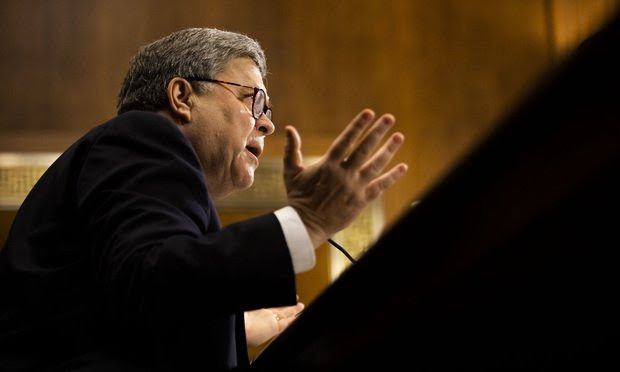
Compliance Reading Corner
Barr Strives to Keep Justice Moving Amid Coronavirus Crisis. "An investigation into whether Alphabet Inc.'s Google is illegally suppressing competition, one that is high on his agenda, continues. The department for months has been investigating the search giant, as well as conducting a broader probe into whether other dominant tech firms are using their power in ways that violate U.S. antitrust law. A Google spokeswoman declined to comment. 'I'm hoping that we bring it to fruition early summer,' Mr. Barr said. 'And by fruition I mean, decision time.'" [WSJ] More here at NYT: In Pandemic, Justice Dept. Seeks Video Court Hearings and Home Detention. Meanwhile, the House Judiciary Committee has postponed a March 31 hearing at which Barr was set to testify.
Bankruptcy Lawyers Prepare for an Onslaught of Battered Companies. "Already, even as bankruptcy lawyers themselves adjust to the new routine of working from home, many are seeing a spike in business they haven't experienced since the September 2001 terrorist attacks and the 2008 global financial crisis. 'I think that at some level this process is going to rewrite the rules of restructuring,' Squire Patton Boggs attorney Karol Denniston said. 'We've never lived at a time where we had to face this many factors at the same time.'" [Bloomberg]
SEC Warns of Risk of Insider Trading During Coronavirus Market Turbulence. "The coronavirus has affected U.S. markets in 'unprecedented' ways, Stephanie Avakian and Steven Peikin, co-directors of the SEC's Division of Enforcement, said in a sharply worded statement released late Monday. Given those 'dynamic circumstances, corporate insiders are regularly learning new material nonpublic information that may hold an even greater value than under normal circumstances,' the statement said." [Washington Post] Read the SEC statement here.
U.S. Regulators Urge Banks to Go Easy on Borrowers Hurt by Coronavirus. "U.S. federal and state financial regulators are encouraging lenders to help borrowers affected by the coronavirus, and will not penalize them for doing so, the regulators said in a joint statement on Sunday. The regulators said they will not criticize banks for 'safe and sound' loan modifications or direct the lenders to categorize them as 'troubled debt restructurings'—something that could affect their financial wellness." [Reuters]
Oil, Mining Companies Voice Opposition to Proposed Disclosure Rule. "A proposed rule mandating the disclosure of payments made by oil, gas and mining companies to foreign governments has become the target of anti-corruption advocates and even some businesses who say it fails to align with international standards. The updated rule, proposed by the U.S. Securities and Exchange Commission in December, seeks to ease the compliance burden the disclosure obligations placed on the extractive industry, according to the agency. But some companies, in written comments to the SEC, have said the proposal will do the opposite." [WSJ]
UK Regulators Put Work on Hold to Ease Coronavirus Burden. "Britain's financial regulators have announced the postponement of "non-critical" regulatory work—on top of the cancellation of the 2020 bank stress tests—to allow financial services groups to focus on customers' needs during the coronavirus disruption." [Financial Times]
Stanley Sporkin, Crusading SEC Enforcer and Tough-Minded U.S. Judge, Dies at 88. "Stanley Sporkin, who was the scourge of industry in the 1970s as the crusading chief enforcement officer of the Securities and Exchange Commission and who later had a colorful and controversial tenure as a federal judge in Washington with strongly worded rulings on high-profile cases, died March 23 at a hospice center in Rockville, Md. He was 88. The cause was congestive heart failure, said his daughter, Elizabeth Sporkin." [Washington Post]
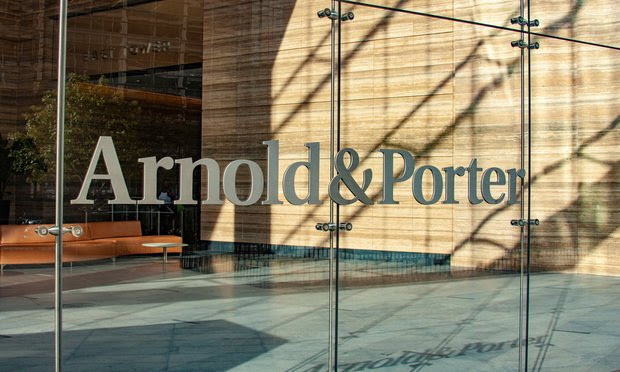
Notable Moves & More
>> Arnold & Porter Kaye Scholer has added Akin Gump Strauss Hauer & Feld partner and former Food and Drug Administration deputy commissioner Howard Sklamberg as a partner in Washington. Sklamberg, whose first day at Arnold & Porter was Monday, will be part of the firm's life sciences and health care regulatory practices. He was immediately placed on his new firm's COVID-19 task force, my colleague Patrick Smith writes.
>> Washington, D.C.-based litigation boutique Weisbrod Matteis & Copley has hired Jim Hood, a former four-term attorney general for the state of Mississippi and a 2019 gubernatorial candidate in the state, as counsel in the firm's Jackson, Mississippi, office.
>> Faegre Drinker said Sean Pugh has joined the firm's Washington office as litigation counsel. Pugh, who will focus on antitrust, most recently was counsel to Sen. Mike Lee, R-Utah, on the Senate Judiciary Committee.
>> Exelon has named David Glockner as new executive vice president of compliance and audit. Glockner, formerly a top U.S. Securities and Exchange Commission official and chief of the criminal division in the U.S. Attorney's Office for the Northern District of Illinois, started this week. He arrives from investment firm Citadel, where he served as chief compliance officer.
This content has been archived. It is available through our partners, LexisNexis® and Bloomberg Law.
To view this content, please continue to their sites.
Not a Lexis Subscriber?
Subscribe Now
Not a Bloomberg Law Subscriber?
Subscribe Now
NOT FOR REPRINT
© 2025 ALM Global, LLC, All Rights Reserved. Request academic re-use from www.copyright.com. All other uses, submit a request to [email protected]. For more information visit Asset & Logo Licensing.
You Might Like
View All
Compliance Hot Spots: GOP Eyes ESG as an Antitrust Issue + Another DOJ Crypto Seizure + Sidley Partner Jumps to Main Justice
9 minute read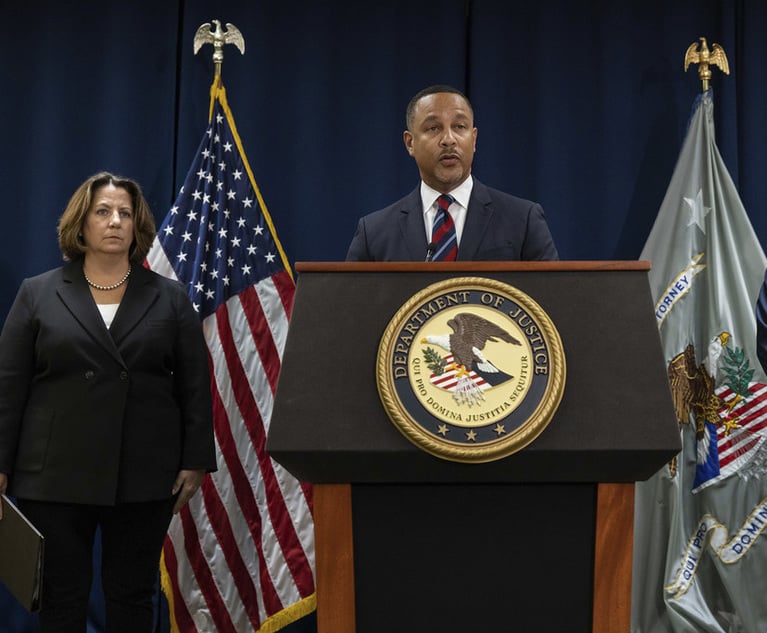
Compliance Hot Spots: Lessons from Lafarge + Fraud Section Chief Talks Compliance + Cravath Lands FTC Commissioner
11 minute readLaw Firms Mentioned
Trending Stories
Who Got The Work
J. Brugh Lower of Gibbons has entered an appearance for industrial equipment supplier Devco Corporation in a pending trademark infringement lawsuit. The suit, accusing the defendant of selling knock-off Graco products, was filed Dec. 18 in New Jersey District Court by Rivkin Radler on behalf of Graco Inc. and Graco Minnesota. The case, assigned to U.S. District Judge Zahid N. Quraishi, is 3:24-cv-11294, Graco Inc. et al v. Devco Corporation.
Who Got The Work
Rebecca Maller-Stein and Kent A. Yalowitz of Arnold & Porter Kaye Scholer have entered their appearances for Hanaco Venture Capital and its executives, Lior Prosor and David Frankel, in a pending securities lawsuit. The action, filed on Dec. 24 in New York Southern District Court by Zell, Aron & Co. on behalf of Goldeneye Advisors, accuses the defendants of negligently and fraudulently managing the plaintiff's $1 million investment. The case, assigned to U.S. District Judge Vernon S. Broderick, is 1:24-cv-09918, Goldeneye Advisors, LLC v. Hanaco Venture Capital, Ltd. et al.
Who Got The Work
Attorneys from A&O Shearman has stepped in as defense counsel for Toronto-Dominion Bank and other defendants in a pending securities class action. The suit, filed Dec. 11 in New York Southern District Court by Bleichmar Fonti & Auld, accuses the defendants of concealing the bank's 'pervasive' deficiencies in regards to its compliance with the Bank Secrecy Act and the quality of its anti-money laundering controls. The case, assigned to U.S. District Judge Arun Subramanian, is 1:24-cv-09445, Gonzalez v. The Toronto-Dominion Bank et al.
Who Got The Work
Crown Castle International, a Pennsylvania company providing shared communications infrastructure, has turned to Luke D. Wolf of Gordon Rees Scully Mansukhani to fend off a pending breach-of-contract lawsuit. The court action, filed Nov. 25 in Michigan Eastern District Court by Hooper Hathaway PC on behalf of The Town Residences LLC, accuses Crown Castle of failing to transfer approximately $30,000 in utility payments from T-Mobile in breach of a roof-top lease and assignment agreement. The case, assigned to U.S. District Judge Susan K. Declercq, is 2:24-cv-13131, The Town Residences LLC v. T-Mobile US, Inc. et al.
Who Got The Work
Wilfred P. Coronato and Daniel M. Schwartz of McCarter & English have stepped in as defense counsel to Electrolux Home Products Inc. in a pending product liability lawsuit. The court action, filed Nov. 26 in New York Eastern District Court by Poulos Lopiccolo PC and Nagel Rice LLP on behalf of David Stern, alleges that the defendant's refrigerators’ drawers and shelving repeatedly break and fall apart within months after purchase. The case, assigned to U.S. District Judge Joan M. Azrack, is 2:24-cv-08204, Stern v. Electrolux Home Products, Inc.
Featured Firms
Law Offices of Gary Martin Hays & Associates, P.C.
(470) 294-1674
Law Offices of Mark E. Salomone
(857) 444-6468
Smith & Hassler
(713) 739-1250




